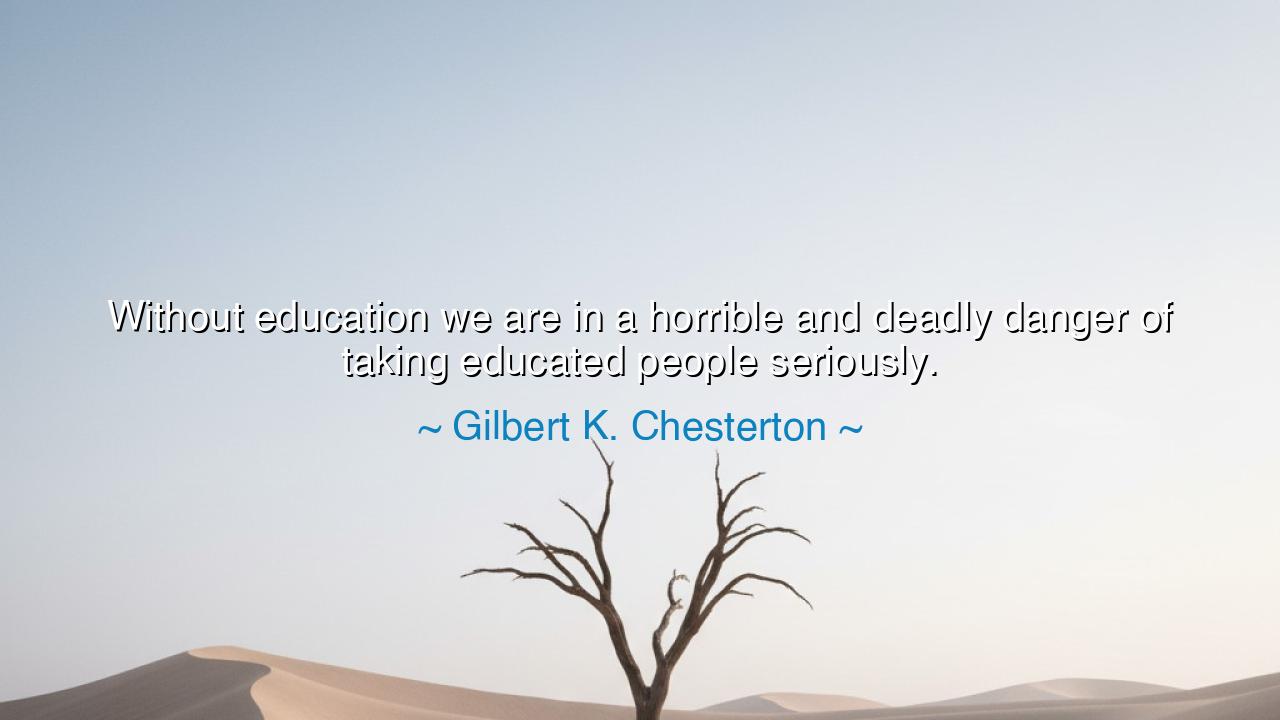
Without education we are in a horrible and deadly danger of
Without education we are in a horrible and deadly danger of taking educated people seriously.






"Without education we are in a horrible and deadly danger of taking educated people seriously." Thus spoke Gilbert K. Chesterton, the master of paradox and wit, whose words were both laughter and lightning. At first hearing, this quote may sound like jest—a clever reversal meant to provoke a smile. Yet beneath the humor lies a deep and timeless warning. Chesterton, writing in an age when modernity was exalting science and scholarship as new gods, sought to remind humanity that education, without wisdom, is as dangerous as ignorance itself. The peril, he said, is not in the existence of the “educated,” but in the blindness of those who worship them unthinkingly.
Chesterton lived in the early 20th century, a time of great change, when technology and ideology were reshaping civilization. He saw that society was beginning to confuse knowledge with wisdom, and credentials with truth. The “educated man,” he warned, could speak with eloquence and authority yet be utterly lost in moral blindness. History, he knew, is filled with men of learning who led nations into ruin because no one dared to question them. The uneducated masses, lacking both education and courage, bowed before the illusion of expertise. Thus, Chesterton’s words strike like a bell in the night: true education is not the memorization of knowledge, but the awakening of judgment—the power to discern the good from the merely clever.
Consider the tragic figure of Dr. Josef Mengele, the Nazi physician called the “Angel of Death.” He was a man of impeccable academic training, holding doctorates in medicine and anthropology. Yet his learning served evil, not truth. His experiments on human beings in Auschwitz were justified by the cold logic of “science,” untempered by morality or compassion. Here lies Chesterton’s warning made flesh: when society bows to educated men without questioning their humanity, knowledge becomes a weapon, and civilization descends into horror. Education without conscience breeds monsters; reverence without reflection breeds followers.
Even in less dark examples, history abounds with those who mistook intelligence for virtue. Empires have fallen because rulers trusted their learned advisers who were wise in rhetoric but ignorant of the human heart. Philosophers have built perfect systems of thought that ignored the messy beauty of life, and in their pursuit of reason, they crushed compassion. Chesterton, ever the defender of common sense, knew that the ordinary man—though simple—often carries a wisdom deeper than the scholar’s books. For it is not degrees that make a person wise, but humility, experience, and moral clarity.
Yet Chesterton did not despise education itself—on the contrary, he cherished it. What he opposed was false education, the kind that teaches people what to think instead of how to think. He believed that a truly educated mind questions authority, weighs evidence, and listens to conscience above convention. Without such discernment, people fall prey to the charisma of “experts” who speak with certainty but not with truth. Thus, he turned the mirror upon society itself: when the uneducated cannot think critically, and the educated cannot feel deeply, the world teeters on the edge of folly.
The ancients would have understood this well. Socrates, though revered as one of the wisest men of Athens, never claimed to be “educated” in the formal sense. He walked the streets questioning those who thought they knew everything, exposing their arrogance with gentle irony. He showed that wisdom begins with admitting ignorance. Chesterton, centuries later, spoke with the same spirit—mocking the proud and reminding us that education divorced from humility becomes arrogance wearing a scholar’s robe.
So let this be the lesson, passed down as a lantern for future generations: seek education, but seek it with reverence, not vanity. Learn to question even the learned. Do not mistake eloquence for truth, nor confidence for virtue. The truly educated person is not the one who knows the most, but the one who never ceases to learn, who measures every theory against the compass of conscience. And if ever you find yourself in the presence of great intellects and powerful voices, remember Chesterton’s warning—do not take them too seriously until you have weighed their hearts. For the purpose of education is not to make us followers of the clever, but defenders of the good, the true, and the just.






AAdministratorAdministrator
Welcome, honored guests. Please leave a comment, we will respond soon